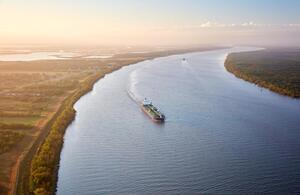UKHO roadmap for a more sustainable maritime future
The UK Hydrographic Office (UKHO) has taken an important step towards a more sustainable future

The journey to a more sustainable future for our oceans and planet is a shared endeavour. The shipping industry has recognised its responsibilities and is making great strides in transitioning to a low-carbon economy driven by a sense of purpose, technological innovation and advancing regulatory framework.
This mirrors the journey faced by many other industrial sectors, organisations, as well as nations and communities around the globe, who are making commitments, developing strategies and taking concrete steps to shape a better future for us all.
Building a better future for our people, the natural world and our communities.
At the UK Hydrographic Office (UKHO), we are playing our part in building a better future for our people, the natural world and our communities.
We can make important contributions towards decarbonising the shipping industry and supporting safe, secure and thriving oceans, not least through the critical role that our products and services play in the transition through route optimisation and improved geospatial data. In this way, we will support our customers in achieving their Net Zero commitments.
We also have a wider role as the Primary Charting Authority for 63 countries. Protecting oceans and marine resources is crucial for the 37% of the global population in coastal communities who rely on the ocean for food, homes and jobs. Our geospatial data is essential for monitoring and protecting these environments and addressing the challenges facing Small Island Developing States and other coastal communities.
We also represent the UK government worldwide as experts and advisors on seabed mapping, marine navigation and marine geospatial data. Our widespread support helps others build an understanding of the marine environment, enabling the protection of the world’s oceans and improving the Safety of Life at Sea.
With such a diverse range of responsibilities and areas of impact, we must think and act in a joined-up, accountable manner when managing our sustainability goals; this is why we have published our first Sustainability Roadmap.
Reducing, offsetting and insetting our emissions to carbon neutrality from 2030.
Our Sustainability Roadmap sets out a 3-year pathway to reduce our negative environmental impact, support the communities we interact with and expand our influence in developing a more sustainable maritime industry.
It sets out our goals as an organisation to reduce our environmental impact through an ambitious science-based commitment to Net Zero by 2050, which involves reducing, offsetting and insetting our emissions to carbon neutrality from 2030.
It also explains our progress towards meeting our Greening Government Commitments (GGC), from adapting to climate change and reducing water consumption to nature recovery, resource efficiency and sustainable procurement. They are integral to delivering a real-world impact on sustainability.
We aligned our roadmap to achieve 12 of the UN Sustainable Development Goals, which we grouped under the themes of charting the course to Net Zero, protecting our communities and sustainable navigation.
Good work is happening across the UKHO concerning our people, communities and contributions to a healthier planet. Our science-aligned Net Zero target, alongside a shorter-term Carbon Neutrality target, will help us quantify our progress while demonstrating our commitment to tackling the effects of climate change.
Crucially, our roadmap will help us understand our work across the UKHO and identify where we are not doing enough and where we need to go further.
Our roadmap sets out our sustainability journey and ambition over the coming years to address the industry’s pressing sustainability challenges. Although shipping is a highly efficient mode of transport and a critical link in global supply chains, it is still a significant source of carbon emissions. Maritime transport is responsible for about 3% of global emissions, emitting around 940 million tonnes of CO2e annually.
To avoid the most dangerous impacts of climate change, we must limit planetary warming to 1.5°C. To achieve this, we must reduce the amount of greenhouse gases added to the atmosphere each year to zero before 2050. Led by the International Maritime Organization’s (IMO) emission reduction goals, we know what we must achieve.
Navigational data helping shipping achieve its 2030 emissions reduction targets.
As a leading provider of navigational data products and services, we recognise our role in the challenge. Although much of the industry discussion on decarbonisation solutions has centred on alternative fuels, advanced vessel designs and new propulsion technologies, the future of navigation – and specifically, navigational data – also has a vital role to play.
Advanced navigational data supports decarbonisation by unlocking the ability to optimise a vessel’s speed, route and operations, which can deliver significant emissions savings. What’s more, it is a solution that can deliver results in the near term, which makes it particularly important if shipping is to achieve its 2030 emissions reduction targets.
From our support for the shipping industry’s energy transition, our contribution towards the sustainability goals of the UK government, our work with our global partners and our environmental footprint as an organisation, our Sustainability Roadmap embeds our sustainability commitments in all of our operations, products and services.
At a time when inaction is not an option, our roadmap helps us to remain accountable for our progress and keeps us on track for our ambitious targets. Armed with a clear vision of the positive impact we can have, we are excited about the difference we can make in combatting climate change, decarbonising shipping and delivering a more sustainable future.
Read our .